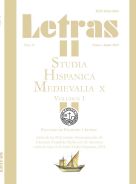Dilemmas of Paradise: Journey, Utopia and Mundanity in Arabic Literature
Keywords:
Journey, Utopia, City, Abundantia, ParadiseAbstract
Utopia and travel literature are narratives that describe complementary though long-awaited worlds. However, in the medieval context we can not understand the concept of utopia in the politic moorean sense characteristic of Modernity, but instead, it should be understood as a process of constructing expectations. These respond to a pattern to be maintained over time in all manifestations of an ideal country or society, and tend to locate the satisfaction of present needs in an inaccessible but relatable remoteness. This is the case of Abundantia, the oldest form of utopia, linked with the kingdom of Saturn and its multiple medieval versions: the Cucaña, the country of Jauja, the Dorado. This is present in various forms in almost all Western European literatures, whereas medieval Arabic literature also makes a particular use of utopia and travel narrative in order to incorporate its religious and cultural vision. We propose to describe the characteristic pattern of utopian literature, and its application in the Islamic narrative of Abundantia, focusing on the legend of the city of copper, told by the Andalusian geographer Abu Hamid al-Garnati and later developed in The Thousand and One Nights.Downloads
Download data is not yet available.
Downloads
Published
2019-04-22
How to Cite
Del Percio, D. (2019). Dilemmas of Paradise: Journey, Utopia and Mundanity in Arabic Literature. Letras, 1(71), 107–116. Retrieved from https://e-revistas.uca.edu.ar/index.php/LET/article/view/1756
Issue
Section
Ponencias
License












